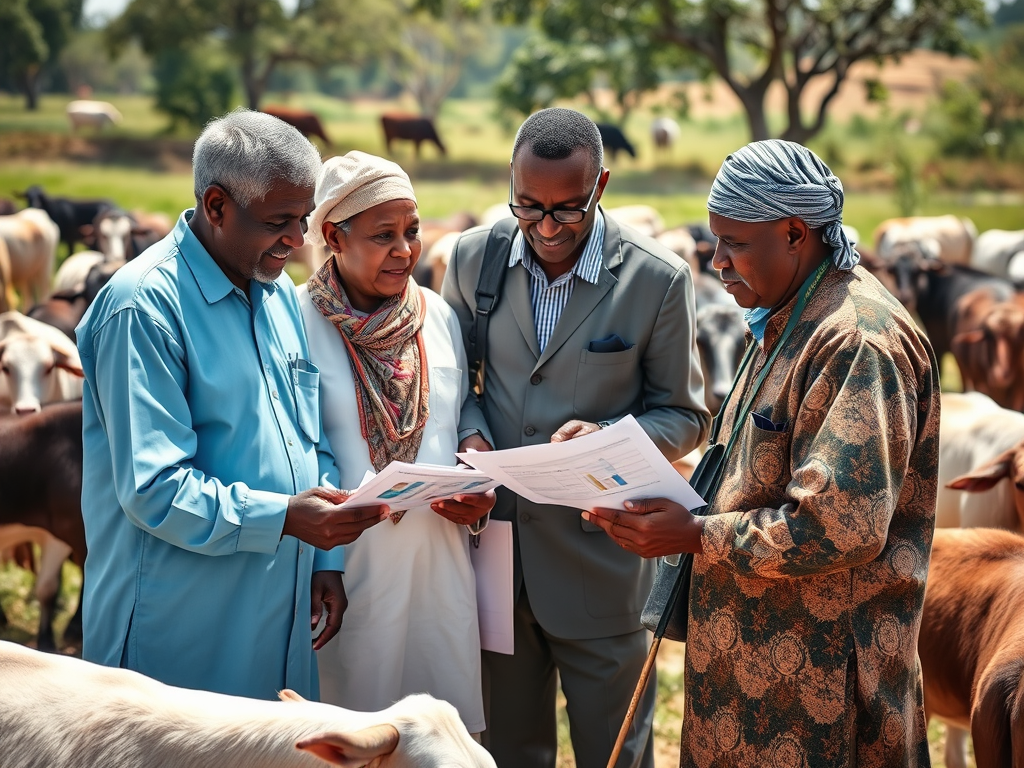Livestock farming is an integral component of agriculture in Nigeria and Africa, contributing significantly to food security, employment, and economic growth. However, the persistent challenge of livestock diseases threatens productivity, profitability, and sustainability. The solution lies in building strategic partnerships across the agricultural value chain to enhance disease management practices. In this article, we explore how collaborative efforts among key stakeholders can revolutionize livestock disease management, boost animal health, and ensure the long-term viability of the livestock sector.
Understanding the Challenge
Livestock diseases, such as foot-and-mouth disease, Newcastle disease, African swine fever, and tick-borne illnesses, pose severe threats to farmers. These diseases:
- Lead to reduced animal productivity (milk, eggs, and meat).
- Result in high mortality rates.
- Increase production costs due to veterinary treatments.
- Cause economic losses from restricted trade.
In sub-Saharan Africa, including Nigeria, the limited availability of veterinary services, high costs of modern medicine, and inadequate access to information exacerbate these issues.
The Role of Strategic Partnerships in Disease Management
Strategic partnerships can transform how livestock diseases are managed. Collaboration among governments, research institutions, private companies, and farmers can enhance efficiency, innovation, and knowledge dissemination.
1. Partnerships with Government Agencies
Governments play a critical role in formulating policies and providing veterinary services. Collaborating with the Federal Ministry of Livestock Development and state ministries can help:
- Develop disease control policies.
- Implement vaccination campaigns.
- Strengthen disease surveillance systems.
For example, in the past, partnerships between farmers and government programs in Nigeria have enabled nationwide livestock vaccination campaigns, reducing the prevalence of major diseases like rinderpest.
2. Collaborating with Research Institutions
Research institutions, such as the International Livestock Research Institute (ILRI), National Veterinary Reseach Institute (NVRI) and local universities, can provide cutting-edge solutions for disease prevention and control.
- Research partnerships can develop vaccines tailored to local strains of diseases.
- Innovative solutions, like ethno-veterinary treatments using neem and garlic, can be refined and made accessible to smallholder farmers.
In Kenya, ILRI worked with local dairy farmers to develop a vaccine against East Coast fever, significantly reducing cattle mortality. Also in Nigeria, NVRI developed and produces smaller doses of Newcastle Disease vaccines for smallholder Farmers
3. Engaging Private Sector Partners
Private companies, including pharmaceutical firms and agritech startups, can provide essential resources such as:
- Affordable and effective veterinary drugs.
- Digital platforms for disease reporting and tracking.
- Mobile apps to educate farmers on disease symptoms and prevention.
An excellent example is Olam International, which has supported livestock farmers in Nigeria by introducing digital tools for disease monitoring and early warning systems.
4. Farmer Cooperatives and NGOs
Farmer cooperatives and NGOs are vital in organizing farmers, providing training, and distributing resources.
- Cooperatives enable bulk purchasing of vaccines and medicines, reducing costs.
- NGOs offer capacity-building programs on biosecurity measures and disease prevention.
For instance, Global Alliance for Veterinary Medicines (GALVMed) has worked with Bdellium Consult Ltd – a Nigerian Agribusiness consultancy to train community poultry agents and farmers across on vaccination and biosecurity protocols, thus significantly reducing Newcastle disease outbreaks among smallholder poultry farms.
Benefits of Strategic Partnerships in Livestock Disease Management
- Improved Disease Surveillance: Partnerships enhance the ability to monitor and control outbreaks through coordinated reporting systems.
- Cost Savings: Collaborative efforts reduce the costs of vaccines, drugs, and treatment.
- Increased Awareness: Training programs help farmers understand and adopt best practices for disease prevention.
- Sustainability: Sustainable farming practices, like using ethno-veterinary medicine, reduce dependency on antibiotics and promote organic production.
- Boosted Productivity: Healthy livestock translates to higher yields and improved income for farmers.
Challenges and How to Overcome Them
While partnerships offer immense potential, certain challenges exist:
- Limited Funding: Governments and NGOs must prioritize livestock health in their budgets.
- Lack of Trust: Building trust among stakeholders requires transparency and regular communication.
- Knowledge Gaps: Training and education are crucial to ensuring farmers understand and adopt new practices.
Conclusion
Livestock disease management is a shared responsibility that requires collective action. Strategic partnerships provide a pathway to overcoming the persistent challenges facing the livestock sector in Nigeria and Africa. By leveraging the expertise and resources of governments, research institutions, private companies, and farmer cooperatives, we can ensure healthier animals, higher productivity, and a sustainable future for livestock farming. Farmers, researchers, and policymakers must unite to make this vision a reality. Together, we can transform livestock farming and secure Africa’s agricultural future.
Call to Action:
What role can you play in building strategic partnerships for livestock disease management? Share your thoughts and experiences in the comments below or reach out to us at AgribusinessSpace.com!


